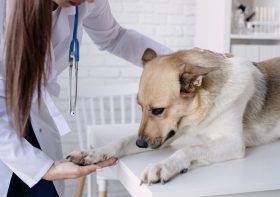How Does Diet Affect My Pet’s Health?

Pet owners often wonder about the role diet plays in their furry companions’ health. The truth is, just like for humans, the food pets consume is critical to their overall well-being. From maintaining a healthy weight to ensuring they get the appropriate nutrients, the diet can make a significant difference in a pet’s quality of life.
Nutritional Needs of Pets
Pets have specific nutritional needs that vary by species, age, and health status. Dogs, for instance, are omnivores requiring a balanced diet that includes proteins, carbohydrates, fats, vitamins, and minerals. Cats, being obligate carnivores, require a diet high in proteins and certain amino acids like taurine, which they cannot produce on their own.
Weight Management and Obesity Prevention
A proper diet helps manage your pet’s weight, preventing obesity—a common issue that can lead to various health problems such as diabetes, joint pain, and heart disease. The key to weight management is a balanced diet that aligns with your pet’s energy expenditure, combined with regular physical activity.
The Link Between Diet and Behaviour
Did you know that what your pet eats can influence their behavior? Imbalanced diets can lead to hyperactivity or lethargy. Foods rich in essential fatty acids, like Omega-3 and Omega-6, are known to support brain health, which can positively affect behavior and training.
Diet and Skin Health
The food that your pet eats has a big effect on the health of their skin and the quality of their fur. Just like people, pets need a good balance of certain nutrients to keep their skin and fur healthy. Proteins, fatty acids, and vitamins are all parts of the diet that help pets look and feel their best. Watching the condition of your pet’s skin and coat can give you clues about whether they’re getting the nutrition they need.
Nutrients for Skin and Coat
Each nutrient in your pet’s diet plays a specific role in maintaining their skin and fur:
-
Proteins help to build and repair skin cells, and they also play a role in making fur strong and smooth.
-
Fatty acids, like omega-3 and omega-6, are important for preventing dry, flaky skin and ensuring the coat is glossy.
Vitamins that Support Skin Health
Vitamins are also essential for skin health:
-
Vitamin A helps with skin repair and maintenance.
-
Vitamin E acts as an antioxidant, which can protect skin cells from damage.
Keeping your pet on a balanced diet rich in these nutrients can help support their skin and coat to be in good condition. However, if you notice rough skin, dull fur, or excessive shedding, it might be time to re-evaluate your pet’s diet.
Your vet can help decide if your pet’s food has everything it needs or if supplements might help. Good nutrition is a key part to keeping your pet healthy, and their skin and coat are one of the easiest ways to tell if their dietary needs are being met.
Specific Health Conditions and Dietary Needs
Certain health conditions may require diet alterations. For example, pets with kidney disease may need a diet low in phosphorus and protein to reduce kidney workload. It’s essential to consult a vet to tailor the diet to your pet’s specific health requirements.
Puppy & kitten vet services are pivotal in determining the appropriate diet for young pets, ensuring they receive the necessary nutrients for growth and development. Working with a veterinarian can help establish a nutritional plan to support your puppy or kitten’s long-term health.
Choosing the Right Food
When selecting pet food, consider the pet’s age, size, breed, and activity level. Read labels carefully to ensure the food provides complete nutrition, and follow feeding guidelines to avoid overfeeding.
Some pet owners opt for homemade or raw diets, seeking control over the ingredients. These diets can be beneficial, but thorough knowledge is required to achieve a balanced diet and avoid nutritional deficiencies or excesses.
Supplements and Additives
While a well-rounded diet typically provides all the necessary nutrients, some pets might require supplements. For instance, older dogs might benefit from glucosamine and chondroitin for joint health.
Food Allergies or Intolerances
Food allergies or intolerances can manifest in various ways, such as gastrointestinal disturbances or skin issues. Identifying and eliminating problem ingredients is critical for your pet’s comfort and health.
Hydration in Diet
Water is a fundamental component of your pet’s diet. Adequate hydration facilitates digestion, nutrient absorption, and waste elimination, among other functions.
Aging Pets and Nutritional Adjustments
As pets age, their dietary needs can change, necessitating tailored nutritional adjustments. Senior pets, whether small companions or larger animals, may require diets with fewer calories but increased fiber and specific nutrients to counteract the effects of aging. Their large animal vet services often include detailed nutrition plans for senior animals to support their unique needs. It is essential to monitor the health of older pets closely and adjust their diet accordingly in collaboration with veterinary professionals.
Long-term Benefits of a Healthy Diet
A well-thought-out diet extends your pet’s lifespan and enhances their quality of life. Here are some of the long-term benefits:
-
Improved immune system function
-
Better weight management
-
Reduced risk of chronic diseases
Emerging Trends in Pet Nutrition
Advancements in pet nutrition continue to emerge, offering innovative ways to maintain pet health. For example, research on the gut-brain axis links gastrointestinal health to mental well-being.
You can view more about the latest pet nutrition here and how emerging treatments, such as stem cell therapy, may intertwine with dietary considerations to promote healing and relief from certain conditions.
To End
Every pet owner wants their animal companion to lead a happy, healthy life. Paying close attention to diet is one of the most substantial influences an owner has over their pet’s health. With thoughtful consideration, regular veterinary consultations, and a commitment to providing the best nutrition possible, pets can enjoy a healthier life fueled by an optimal diet.


